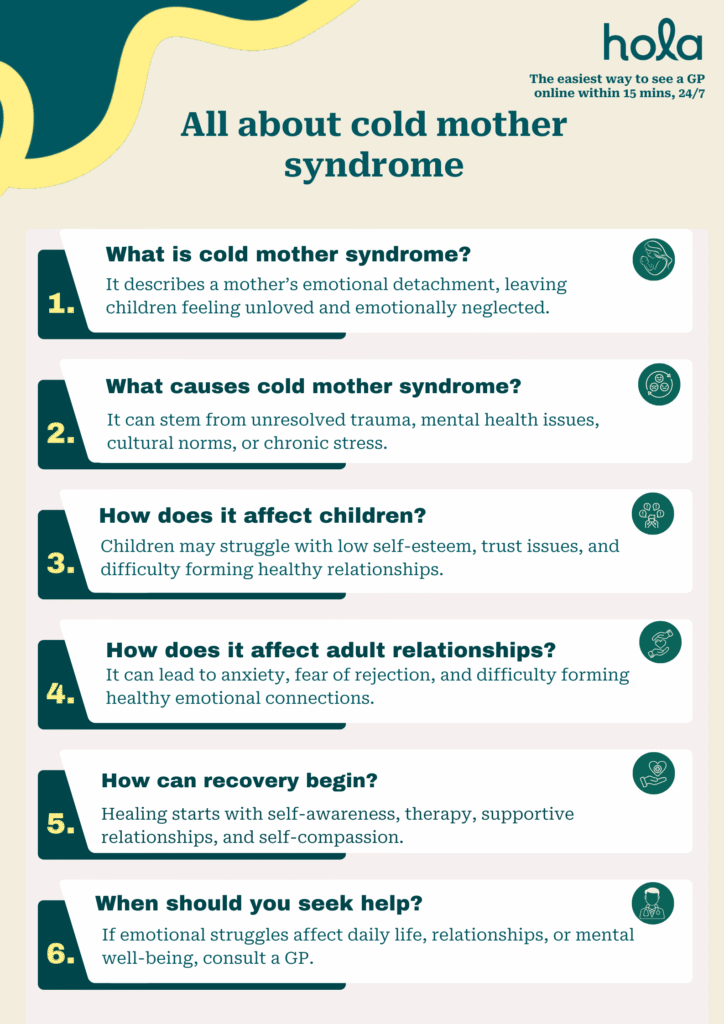Cold mother syndrome: Signs and recovery guide
Written by editorial staff writer at Hola. Medically reviewed by Amira Shah, MA in Counselling Psychology, Registered Psychotherapist.

Contents

Summary: Cold Mother Syndrome refers to emotionally distant parenting that can lead to low self-esteem, emotional detachment, and challenges in adult relationships. While not a clinical diagnosis, the impact is real. Healing includes therapy, setting boundaries, and reconnecting with your feelings to foster a happier, more balanced life.
As children, we naturally seek warmth, comfort, and emotional connection from our mothers. But what happens when that warmth is missing? When a mother feels distant, disengaged, or emotionally cold, it can leave a child confused and longing for an undefined sense of love and acceptance. This experience, often referred to as Cold Mother Syndrome, is not a medically recognised diagnosis in any diagnostic manual such as DSM-5, but it’s a real emotional experience faced by many who grew up feeling ignored or emotionally neglected. Let’s explore the signs of this syndrome and, more importantly, how to begin healing from the wounds it leaves behind.
What is cold mother syndrome?
Cold mother syndrome describes a tendency for a mother to be emotionally detached and lacking in warmth toward her child. A "cold" mother might be distant, unresponsive, or overly critical, often failing to provide the affection, support, or emotional validation a child requires. This can result in children feeling unloved, insecure, or anxious into adulthood. While not classified as a formal medical diagnosis, the term is informally used in psychology to explain the lasting emotional consequences of having a mother who is distant or emotionally unavailable.What causes cold mother syndrome?
- Unresolved childhood trauma: Mothers who faced emotional neglect or trauma during their own childhood may struggle to express affection or build secure emotional connections.
- Mental health issues: Conditions like depression, anxiety, or personality disorders can influence a mother's ability to engage emotionally with her child.
- Cultural or generational expectations: Societal norms that discourage emotional expression can impact a mother's ability to connect emotionally.
- Stress and lack of support: High stress levels, unresolved personal challenges, or insufficient support can impede a mother’s capacity for emotional connection.
Also read: Emotionally unavailable: Meaning & spotting the signs
Symptoms of cold mother syndrome
Indicators of cold mother syndrome frequently manifest in a child's emotional and behavioural tendencies. These may involve low self-esteem, an inability to trust others, fear of intimacy, and a persistent need for validation. Those affected might find it difficult to convey emotions or develop healthy relationships. They may also deal with anxiety, perfectionism, or emotional numbness. In certain instances, adults raised by emotionally distant mothers may feel perpetually unloved or misunderstood, even when they succeed in other aspects of life. These emotional challenges generally arise from a lack of warmth, recognition, or support during childhood.
Ready for positive change? Start your mental health care plan here.
The emotional impact
The emotional consequences of cold mother syndrome can be profound and enduring. Children brought up by emotionally distant mothers often mature feeling unworthy, unloved, or emotionally neglected. This can result in anxiety, depression, and struggles with forming or sustaining healthy relationships. Many individuals encounter self-doubt, fear of rejection, or an overwhelming need for external validation. As adults, they may continue to seek the emotional connections they missed out on, sometimes replicating patterns of emotional distance or insecurity in their relationships. Recovery generally necessitates acknowledging these patterns and confronting the pain linked to early relational trauma.Steps toward emotional recovery
Taking steps toward emotional recovery from cold mother syndrome starts with self-awareness.- Understand how distant parenting relationships influence your emotional reactions and beliefs is vital.
- Therapy is a vital step, particularly with professionals skilled in attachment issues or childhood trauma. You can learn to establish healthy boundaries, enhance self-worth, and safely express emotions through therapy.
- Journaling, mindfulness practices, and support groups can also aid in processing feelings.
- Surrounding yourself with supportive relationships and engaging in self-compassion are crucial for healing and breaking harmful emotional patterns that originated in childhood.
Also read: Signs of an emotionally unavailable woman: Therapist’s guide
How to support those affected by cold mother syndrome
Supporting someone dealing with cold mother syndrome involves providing consistent emotional warmth, understanding, and patience. Listen without judgment and validate their emotions, even if their experiences are difficult to relate to. Encourage open dialogue and gently assist them in expressing feelings they may have learned to suppress. It is important to avoid minimising their pain or attempting to "fix" them; being emotionally present can be immensely impactful. Suggest therapy and remind them that healing is attainable if they are receptive. Building trust and demonstrating genuine care over time can help them feel secure, valued, and emotionally supported.
When to talk to a GP
You should consult a general practitioner if the emotional impacts of cold mother syndrome begin to disrupt your daily activities, relationships, or mental well-being. Symptoms such as ongoing sadness, anxiety, feelings of low self-esteem, or challenges in managing emotions may suggest that you should seek assistance. A GP can evaluate your mental health, provide support, and refer you to a psychologist or counsellor for additional treatment. If you feel overwhelmed, alone, or uncertain about beginning the healing process, a GP is an excellent initial step toward obtaining professional help.
How telehealth can help you heal
Telehealth can assist you in overcoming cold mother syndrome by granting convenient access to mental health professionals, including therapists experienced in Mental Health Treatment Plans (MHTP). Through online video or phone appointments, you can obtain personalised therapy from the comfort of your home, making it more manageable to incorporate sessions into your routine. An MHTP enables you to qualify for Medicare rebates for up to 10 subsidised therapy sessions annually, lowering continued care costs. Telehealth provides a secure, private, and adaptable means to address emotional difficulties and support your recovery journey.
Conclusion:
You can’t change the past, but you can redefine your journey. Healing from a cold mother isn’t about blame, it’s about rediscovering your inner voice, building better connections, and giving yourself the love you always deserved. It’s not easy, but it is worth it.

FAQs
How to deal with a cold and emotionally distant mother?
Start by accepting her shortcomings without blaming yourself. Focus on your emotional health by setting clear boundaries, seeking support from others, and exploring the impact through therapy or self-reflection. You can build your warmth without relying on hers for emotional validation
Signs you were raised by an emotionally unavailable parent.
Common signs include:
- Difficulty understanding or expressing your feelings
- Feeling isolated despite being with loved ones
- Low self-esteem or feelings of worthlessness
- Fear of rejection or detachment
- Trouble trusting others or forming close bonds
- Constantly seeking validation
- Emotional numbness
- Difficulty saying no or standing up for your needs
Can emotional neglect cause anxiety and depression?
Yes, emotional neglect, especially during childhood, can lead to Chronic stress and disruptions in emotional development, which often contribute to mental health condition such as depression and anxiety in adulthood.
How to heal from emotional detachment in childhood?
Healing steps include:
- Understanding and accepting your feelings
- Being kind to yourself and staying present
- Developing safe and nurturing connections with others
- Learning to say no and protect your personal space
- Reconnecting with your feelings through journaling, art, or other expressive practices
- Talking to a therapist, especially one who understands trauma or relationships
Getting therapy for emotional neglect is not about blaming your parents-its about reclaiming your emotional well-being and building a healthier sense of self.
Is telehealth effective for childhood trauma recovery?
Yes, telehealth therapy can work just as well as in-person sessions for childhood trauma recovery. It gives you access to qualified professionals, flexible scheduling, and a comfortable setting, making it easier to open up and stay consistent.
Is cold mother syndrome a medical diagnosis?
No, cold mother syndrome isn’t an official medical or psychological diagnosis. It’s a descriptive term used to explain the emotional effects of having an emotionally distant or unresponsive mother. While it’s not an official term, the experiences it reflects are very real and valid.
Take control of your mental health. Begin your care plan now.
What we treat
- Cough
- Nausea & vomiting
- Fever
- Hayfever
- Fatigue
- Sore throat
- Acne
- Hair loss
- Gout
- Eczema
- Rosacea
- Sunburn
- UTI
- Erectile dysfunction
- Contraception
- Morning sickness
- Morning after pill
- Prostate health
- Anxiety
- Depression
- Stress
- Grief & loss
- Antidepressants
- Premature ejaculation
- Asthma
- Blood pressure
- Blood thinners
- Diabetes
- Cholesterol
- Migraines & headaches
- Allergies
- Body ache
- Heartburn & reflux
- Sleep disorder
- Pain relief
- Gastro
Related Articles
Disclaimer
This blog is for general informational purposes only and does not indicate that Hola Health provides all treatments or preventive measures mentioned. It is not intended to be a substitute for professional medical advice. Always seek the guidance of your doctor or other qualified health professional with any questions you may have regarding your health or a medical condition. For emergencies please immediately contact 000. Any medical topics discussed are intended to educate, not to imply availability through Hola Health.

Get affordable healthcare on your terms, with quick access to qualified, Australian-registered telehealth doctors & health practitioners, 24/7, 365 days a year. No more searching for ‘doctors near me‘ – Hola connects you instantly.
Address: 79 St Georges Terrace, Perth WA 6000


Hola Health App
Get affordable healthcare on your terms, with quick access to qualified, Australian-registered telehealth doctors & health practitioners, 24/7, 365 days a year. No more searching for ‘doctors near me‘ – Hola connects you instantly.
Call 000 for emergency or urgent medical help.
Address: 79 St Georges Terrace, Perth WA 6000
© Hola Health, a brand of Packapill Pvt Ltd


 Facebook
Facebook  X
X  Copy Link
Copy Link












